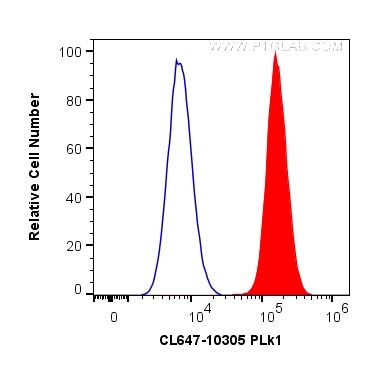Tested Applications
| Positive FC (Intra) detected in | HeLa cells |
PLK1 expression is low or nonexistent in normal tissues, but high in tumor tissues.
Recommended dilution
| Application | Dilution |
|---|---|
| Flow Cytometry (FC) (INTRA) | FC (INTRA) : 0.20 ug per 10^6 cells in a 100 µl suspension |
| It is recommended that this reagent should be titrated in each testing system to obtain optimal results. | |
| Sample-dependent, Check data in validation data gallery. | |
Product Information
CL647-10305 targets PLK1 in FC (Intra) applications and shows reactivity with human, mouse, rat samples.
| Tested Reactivity | human, mouse, rat |
| Host / Isotype | Rabbit / IgG |
| Class | Polyclonal |
| Type | Antibody |
| Immunogen |
CatNo: Ag0284 Product name: Recombinant human PLK1 protein Source: e coli.-derived, PGEX-4T Tag: GST Domain: 415-603 aa of BC002369 Sequence: VDYSDKYGLGYQLCDNSVGVLFNDSTRLILYNDGDSLQYIERDGTESYLTVSSHPNSLMKKITLLKYFRNYMSEHLLKAGANITPREGDELARLPYLRTWFRTRSAIILHLSNGSVQINFFQDHTKLILCPLMAAVTYIDEKRDFRTYRLSLLEEYGCCKELASRLRYARTMVDKLLSSRSASNRLKAS Predict reactive species |
| Full Name | polo-like kinase 1 (Drosophila) |
| Calculated Molecular Weight | 68 kDa |
| Observed Molecular Weight | 62 kDa |
| GenBank Accession Number | BC002369 |
| Gene Symbol | PLK1 |
| Gene ID (NCBI) | 5347 |
| RRID | AB_2934815 |
| Conjugate | CoraLite® Plus 647 Fluorescent Dye |
| Excitation/Emission Maxima Wavelengths | 654 nm / 674 nm |
| Form | Liquid |
| Purification Method | Antigen affinity purification |
| UNIPROT ID | P53350 |
| Storage Buffer | PBS with 50% glycerol, 0.05% Proclin300, 0.5% BSA, pH 7.3. |
| Storage Conditions | Store at -20°C. Avoid exposure to light. Stable for one year after shipment. Aliquoting is unnecessary for -20oC storage. |
Background Information
PLK1(Polo-like kinase 1), also named as PLK and STPK13, belongs to the protein kinase superfamily, Ser/Thr protein kinase family and CDC5/Polo subfamily. PLK1 is a Serine/threonine-protein kinase that performs several important functions throughout M phase of the cell cycle, including the regulation of centrosome maturation and spindle assembly, the removal of cohesins from chromosome arms, the inactivation of APC/C inhibitors, and the regulation of mitotic exit and cytokinesis.The localization of Polo changes during the cell cycle. In interphase, Polo shows a mostly diffuse cytoplasmic localization. Polo becomes concentrated on centrosomes from early prophase and appears on centromeres or kinetochores from late prophase, before nuclear envelope breakdown (NEB). After anaphase onset, Polo relocalizes to the central spindle and remains enriched at the midbody ring in late stages of cytokinesis (PMID: 29167465).
Protocols
| Product Specific Protocols | |
|---|---|
| FC protocol for CL Plus 647 PLK1 antibody CL647-10305 | Download protocol |
| Standard Protocols | |
|---|---|
| Click here to view our Standard Protocols |




